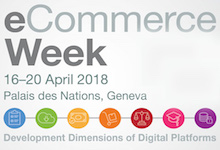How to overcome barriers to cross-border digital payments
16 Apr 2018 15:00h - 16:30h
Event report
[Read more session reports from the UNCTAD E-Commerce Week 2018]
This session was moderated by Mr Michael Kende (Visiting Professor, Graduate Institute of International and Development Studies). The discussion revolved around challenges in making and receiving digital payments, and how these challenges hinder entrepreneurship in many emerging economies. Representatives from top international financial organisations and payment platforms spoke about how this impacts e-commerce and development.
Mr Dulith Herath (Founder and Chairman, Kapruka.com)opened by summarising his company’s innovative role in Sri Lanka. Small and medium sized enterprises (SMEs) in the country cannot sell on Amazon because of trade obstacles with PayPal and buyer-to-seller currency conversions. He explained that his organisation creates proxies for countries without PayPal, handles transactions, and charges a fee for the service. This provides a global reach for SMEs in countries that are traditionally blocked from entering the market. Herath said that this opens doors into online marketplaces like Etsy, Amazon, and eBay. Having verifiable payment systems is a key part of starting a valid online business.
Mr Mohamed Es Fih (eSolutions Adviser, International Trade Centre (ITC)) reiterated Herath’s concerns about PayPal limitations, but underlined a necessity for the tool to gain consumer trust. He discussed a campaign in Tunisia named #WinouPayPal, translated as ‘where is PayPal’ in Arabic, that started drew attention to the limited number of emerging countries they provide services to. PayPal is available in over 200 countries for buyers, but in Africa only 13 countries can sell with the service. SMEs in developing countries have had cash flow ‘blocked up to 180 days,’ decreasing customer confidence. These countries need access to the platforms that their customers use to gain relevance in the e-commerce market.
Ms Sahra English (Vice President, Global Public Policy, MasterCard) described MasterCard as an intermediary between the consumer’s bank and the merchant’s bank; pointing out that they are not a credit card company. She said that increasing the presence of online merchants is the biggest challenge that the company faces. Fragmentation of payment systems around the world hurts SMEs that want to conduct cross-border business. English stated that the company if following standards from the International Organization for Standardization, so their system has seamless communication with other companies that comply with the same standards. She highlighted MasterCard’s initiative in Uganda, where they developed a digital marketplace called 2Kuze. This platform handles payments and uses SMS to notify farmers about what is in demand among local buyers.
Ms Cristina Picillo (Member, Secretariat of the Committee on Payments and Market Infrastructures, Bank for International Settlements) concluded the session by sharing two models for back-end financial processes: (i) correspondent banking challenges, and (ii) closed loop systems. The first faces challenges with a shrinking network of banks because correspondent banks do not generate enough revenues to overcome compliance costs. The latter is an emerging model, however it is still subject to compliance. Moreover, different closed loops systems are not connected, which circles back to a problem of fragmentation. Picillo suggested that solutions will come from international co-operation on correspondent banking. She stated that standardisation is essential for moving forward and combatting cross-border correspondence issues.
By Isabel Ashley
Related topics
Related event

